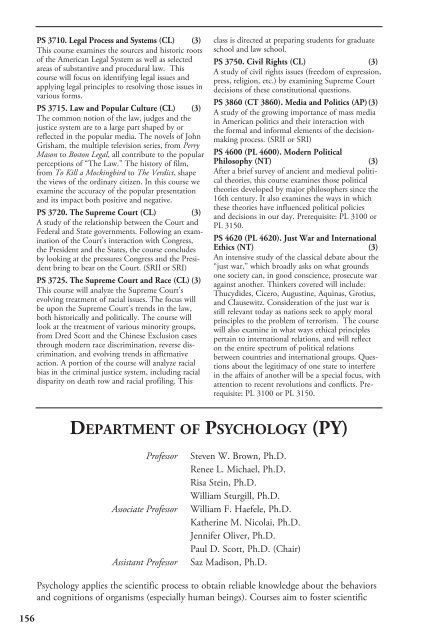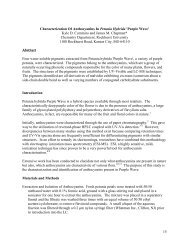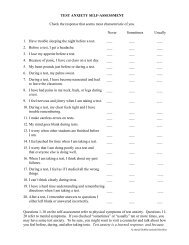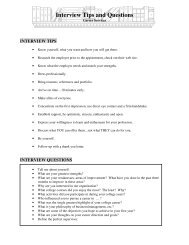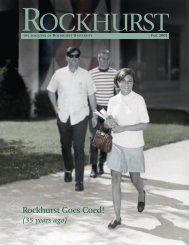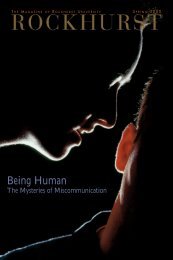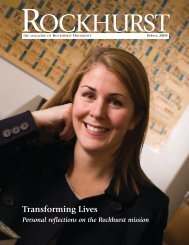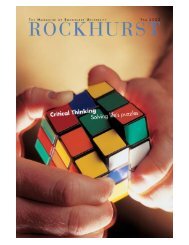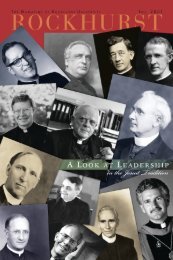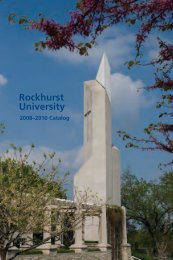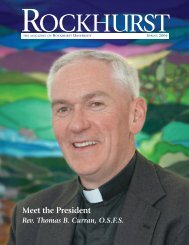- Page 1:
Rockhurst University2012-2014 Catal
- Page 5 and 6:
Special Undergraduate Academic and
- Page 7:
Accreditation and AffiliationsRockh
- Page 10:
Living Our Tradition Today: We are
- Page 13 and 14:
Core Values• Promoting analytical
- Page 15 and 16:
Evening ProgramsThrough the School
- Page 17 and 18:
Undergraduate StudiesThis section p
- Page 19 and 20:
Admission with a GED (General Educa
- Page 21 and 22:
2. English translations of final of
- Page 23 and 24:
Undergraduate Tuitionand FeesFor sp
- Page 25 and 26:
Alumni Discount ProgramIn an effort
- Page 27 and 28:
Return of Federal FundsThe return o
- Page 29 and 30:
Undergraduate Financial AidPrograms
- Page 31 and 32:
Coordination of Financial AidAny fi
- Page 33 and 34:
ing federal regulations and institu
- Page 35 and 36:
Right to AppealAll students have th
- Page 37 and 38:
Employment OpportunitiesCareer Serv
- Page 39 and 40:
Meeting with their assigned academi
- Page 41 and 42:
numbers are given here. Some specif
- Page 43 and 44:
of college credit and a score of 3
- Page 45:
NPIXWWFAUNot Passing. This grade wi
- Page 48 and 49:
46The Robin Bowen Leadership Award.
- Page 50 and 51:
48The Barbara Wynne Outstanding Bio
- Page 52 and 53:
professional, and personal growth.
- Page 54 and 55:
52Requirements for Earning a Second
- Page 56 and 57:
Faculty should clearly communicate
- Page 58 and 59:
56III. Nurturing Academic HonestyFa
- Page 60 and 61:
within ten working days of timely r
- Page 62 and 63:
602. If within 14 days of the instr
- Page 64 and 65:
62AuditThose students taking course
- Page 66 and 67:
AppealIf a student fails to notify
- Page 68 and 69:
66directly through assessment of st
- Page 70 and 71:
Confidential letters and statements
- Page 72 and 73:
19. The University may disclose to
- Page 74 and 75:
72in requesting or obtaining the in
- Page 76:
74University Communication with Stu
- Page 80 and 81:
an idea, construct a logical sequen
- Page 82 and 83:
College of Arts & SciencesAcademic
- Page 84 and 85:
Art (AR)(Department of Communicatio
- Page 86 and 87:
AR 3470. Alternative and Historic P
- Page 88 and 89:
ested in other areas of inquiry the
- Page 90 and 91:
Fall onlyHonors General Biology IHu
- Page 92 and 93:
BL 3430. Seminar in Genetics (1)A d
- Page 94 and 95:
isms to foreign organisms or other
- Page 96 and 97:
ElectivesTwo additional courses (si
- Page 98 and 99:
Students seeking secondary school t
- Page 100 and 101:
cloning. The application of these m
- Page 102 and 103:
ture Writing, JN 3050 Editing and D
- Page 104 and 105:
with Catholicism, diverse tradition
- Page 106 and 107:
Japanese (JA)JA 1100. Introduction
- Page 108 and 109: SP 3700. Introduction to Hispanic L
- Page 110 and 111: Undergraduate students interested i
- Page 112 and 113: is not designed to develop an exper
- Page 114 and 115: Strategic Communication (SC)(Depart
- Page 116 and 117: 114its very distinct rise and fall,
- Page 118 and 119: Engineering Science (ES)(Division o
- Page 120 and 121: division courses in related subject
- Page 122 and 123: 120are offered by semester. Student
- Page 124 and 125: the tensions and opportunities of a
- Page 126 and 127: The Bear, Spotted Horses, Old Man,
- Page 128 and 129: Global Studies (GS)Program Director
- Page 130 and 131: GS 1000. Introduction to Global Stu
- Page 132 and 133: from the foundation of the monarchy
- Page 134 and 135: 132between the movements, and (c) a
- Page 136 and 137: Journalism (JN)(Department of Commu
- Page 138 and 139: There are many career paths open to
- Page 140 and 141: 138tions, probability distribution
- Page 142 and 143: MS 1250. Rockhurst University Choru
- Page 144 and 145: Natural Science (NS)Associate Profe
- Page 147 and 148: PL 3200. Philosophy of God (3)This
- Page 149 and 150: ing. Texts from major philosophers
- Page 151 and 152: Physics (PH)(Department of Mathemat
- Page 153 and 154: therapy fields will be stressed. St
- Page 155 and 156: sis of human movement to video. In
- Page 157: PS 1000. Introduction to Politics (
- Page 161 and 162: niques (e.g., correlation, regressi
- Page 163 and 164: pline separate from physiology and
- Page 165 and 166: Sociology (SO)(Department of Social
- Page 167 and 168: (across the floor), center combinat
- Page 169 and 170: Students have the option of taking
- Page 171 and 172: TH 4100. Catholic and Protestant Th
- Page 173 and 174: Women’s Studies (WS)Program Coord
- Page 175 and 176: Additional information concerning t
- Page 177 and 178: Rockhurst offered the first evening
- Page 179 and 180: • Exposing students to the profes
- Page 181 and 182: Freshman Pre-Admission Criteria for
- Page 183 and 184: CD 3250. Anatomy and Physiology of
- Page 185 and 186: Ethics Focus (completion of one the
- Page 187 and 188: In accordance with the Rockhurst Un
- Page 189 and 190: ED 4900 Integrated Student Teaching
- Page 191 and 192: The Professional Semester(Fall and
- Page 193 and 194: Course DescriptionsED 1320. Multicu
- Page 195 and 196: ED 4400. Assessing Literacy Develop
- Page 197 and 198: EnglishFor the specific degree requ
- Page 199 and 200: The required related upper-division
- Page 201 and 202: SM 4000. Legal Issues and Governanc
- Page 203 and 204: Course DescriptionsLS 2000. Introdu
- Page 205 and 206: The B.A. in Nonprofit Leadership St
- Page 207 and 208: Course DescriptionsNonprofit Leader
- Page 209 and 210:
Paralegal Studies (PA)(Department o
- Page 211 and 212:
PA 3800. Domestic Relations (3)Acqu
- Page 213 and 214:
UNDERGRADUATE STUDIES IN THEHelzber
- Page 215 and 216:
A Helzberg School of Management deg
- Page 217 and 218:
Prerequisites for the BSBA DegreeAl
- Page 219 and 220:
A sample course of study for studen
- Page 221 and 222:
funds and venture capital organizat
- Page 223 and 224:
Required Additional Upper-division
- Page 225 and 226:
Economics Minor—Managerial Perspe
- Page 227 and 228:
with faculty and staff, and are int
- Page 229 and 230:
do they learn the substance of what
- Page 231 and 232:
organization, game theory, and comp
- Page 233 and 234:
Research College of NursingAdminist
- Page 235 and 236:
AdmissionAdmission to the Research/
- Page 237 and 238:
Degree RequirementsTraditional B.S.
- Page 239 and 240:
NU 3430/3431. Adult Health Nursing
- Page 241 and 242:
NU 3785. Issues in Pediatric/Neonat
- Page 243 and 244:
Victoria Uzomah (2007)Assistant Pro
- Page 245 and 246:
High School GPA of 3.5 or higherCol
- Page 247 and 248:
Core Curriculum lays a strong found
- Page 249 and 250:
The Pre-Occupational Therapy Progra
- Page 251 and 252:
The Center for Arts and LettersThe
- Page 253 and 254:
College LifeStudent DevelopmentWe b
- Page 255 and 256:
demic credit, a letter grade is awa
- Page 257 and 258:
• Students classified as juniors
- Page 259 and 260:
Athletic ProgramsIntercollegiate Sp
- Page 261 and 262:
Graduate Degrees OfferedThrough the
- Page 263 and 264:
computer-based test; 79 on the inte
- Page 265 and 266:
Health InsuranceA health insurance
- Page 267 and 268:
Students receiving federal financia
- Page 269 and 270:
derived from grades, that allows fo
- Page 271 and 272:
Federal Direct Graduate Plus LoanTh
- Page 273 and 274:
Enrollment Status and Normal Study
- Page 275 and 276:
cannot count toward both degrees. U
- Page 277 and 278:
WFAUWithdraw fail. This means the s
- Page 279 and 280:
Other Academic PoliciesAttendance P
- Page 281 and 282:
college or school within which the
- Page 283 and 284:
TimeFor purposes of counting time,
- Page 285 and 286:
and the instructor. The chair of th
- Page 287 and 288:
pleted the withdrawal process they
- Page 289 and 290:
AssessmentRockhurst University is c
- Page 291 and 292:
dent. The University does not requi
- Page 293 and 294:
University governing the use or pos
- Page 295 and 296:
ecords, if any, were received; the
- Page 297 and 298:
student to clean their e-mail boxes
- Page 299 and 300:
Department of CommunicationSciences
- Page 301 and 302:
An outline summary of the CSD gradu
- Page 303 and 304:
Admission to the CSD graduate progr
- Page 305 and 306:
Course DescriptionsCD 6110. Articul
- Page 307 and 308:
CD 7280. Autism (2)This course will
- Page 309 and 310:
We are committed to the Rockhurst U
- Page 311 and 312:
ED 6400 Advanced Psychological Foun
- Page 313 and 314:
ReadmissionShould a graduate studen
- Page 315 and 316:
All individuals will take the follo
- Page 317 and 318:
Candidates will identify student ne
- Page 319 and 320:
have difficulty reading and underst
- Page 321 and 322:
Admission to the ProgramThe Occupat
- Page 323 and 324:
Rolling AdmissionsThe Rockhurst Uni
- Page 325 and 326:
Year 2 SummerOT 6000 Neuroscience (
- Page 327 and 328:
utilized by occupational therapists
- Page 329 and 330:
ion referenced assessments used wit
- Page 331 and 332:
Therapy Scholars. Opportunities als
- Page 333 and 334:
5. Consistently demonstrate profess
- Page 335 and 336:
Year 2SpringPT 7322 PT Mgmt of MS C
- Page 337 and 338:
PT 6304. Physical Therapy Managemen
- Page 339 and 340:
PT 7322. Physical Therapy Managemen
- Page 341 and 342:
PT 8630. Advanced Examination and T
- Page 343 and 344:
GRADUATE STUDIES IN THEHelzberg Sch
- Page 345 and 346:
The Executive Fellows ProgramThe Ex
- Page 347 and 348:
Core Managerial Perspective Courses
- Page 349 and 350:
RegistrationA priority system of en
- Page 351 and 352:
Industry Perspective coursesHC 6125
- Page 353 and 354:
plays an important role in the cour
- Page 355 and 356:
Health Care Leadership/Health CareM
- Page 357 and 358:
clear focus on both professional de
- Page 359 and 360:
Rockhurst CommunityAdministrationAs
- Page 361 and 362:
Division of Natural, Appliedand Qua
- Page 363 and 364:
Joseph A. CirincioneProfessor of En
- Page 365 and 366:
Shatonda S. JonesVisiting Instructo
- Page 367 and 368:
Sudhakar S. RajuProfessor of Financ
- Page 369 and 370:
Margaret E. WyeProfessor of English
- Page 371 and 372:
Amy A. McMinnLecturer in Exercise a
- Page 373 and 374:
Emeritus FacultyRev. Eugene Arthur,
- Page 375 and 376:
Campus FacilitiesThe 60-acre Rockhu
- Page 377 and 378:
On-Campus Housingu Xavier-Loyola (1
- Page 379 and 380:
Computer ServicesThe academic and a
- Page 381 and 382:
1975Van Ackeren Gallery of Religiou
- Page 383 and 384:
2009The University welcomed the lar
- Page 385 and 386:
1971-1972Edwin O. ReischauerJames M
- Page 387 and 388:
Endowed ScholarshipsGenerous friend
- Page 389 and 390:
Dierks, in support of deserving Roc
- Page 391 and 392:
member of the Rockhurst University
- Page 393 and 394:
e graduates of Catholic high school
- Page 395 and 396:
• The Thomas J. Savage, S.J. Scho
- Page 397 and 398:
• The Dr. John F. White III Memor
- Page 399 and 400:
Endowments to Support the Rockhurst
- Page 401 and 402:
• The Paul Quigley Fund was estab
- Page 403 and 404:
Outstanding Service Award1991 Josep
- Page 405 and 406:
Athletic Hall of Fame1981 James J.
- Page 407 and 408:
George and Gladys Miller Chair in B
- Page 409 and 410:
General PoliciesSection 1—Equal E
- Page 411 and 412:
HarassmentRockhurst prohibits unwel
- Page 413 and 414:
his/her discretion, designate anoth
- Page 415 and 416:
INDEX*Bold italics denote informati
- Page 417 and 418:
College of Arts and SciencesAdminis
- Page 419 and 420:
GMAT, MBA Admission................
- Page 421 and 422:
Missouri Marguerite-Ross Barnett Sc
- Page 423:
TTalent scholarships ..............


